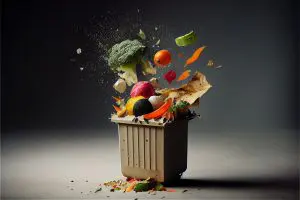
Restaurants in the United States are responsible for producing a significant amount of food waste. The Environmental Protection Agency (EPA) estimated that in 2018, 24% of all trash sent to landfills and 22% of all trash combusted with energy recovery was food waste. That’s an estimated 22-33 billion pounds of food waste. Oversized portions and elaborate menu options are some of the causes that contribute to the problem of restaurant food waste. On average, 17% of restaurant meals remain uneaten on diners’ plates, with 55% of leftovers being left at the restaurant.
What contributes to restaurant food waste?
The problem of restaurant food waste is largely attributed to the increase in meal portion sizes over the past three decades. Today’s restaurant serving sizes are 8-10 times larger than what is recommended by the USDA and Federal Drug Administration. Additionally, kitchen staff behaviors contribute to the issue by overpreparing food, improperly storing ingredients, and failing to utilize food scraps and trimmings effectively. Restaurant food waste is not just the discarded plates of food. The water and agricultural chemicals used to nourish plants, energy spent on growing food products, and labor used to store, transport, and prepare food all go to waste.
Is food waste recycled into compost?
When restaurants properly separate organics for composting, they divert further waste from filling landfills. Restaurants that participate in composting also reduce waste hauling fees. Overall, their efforts to recycle food waste are rewarded with making a positive environmental impact. Many types of common restaurant food waste can be successfully composted, such as food scraps from fruit and vegetable waste. While certain food waste such as fats, oils, and greases cannot be composted. In these cases, it is important to recycle it with SeQuential by joining its free used cooking oil collection program. Grease will be collected regularly by SeQuential and enter its recycling process.
How can restaurants limit food waste?
While resources are available to recycle food waste, restaurants should consider utilizing methods to limit food waste whenever possible. Conduct a food waste audit to help determine what products are most frequently discarded and adjust from there.
Check out the tips below to get you started on reducing your food waste impact:
- Avoid contributing food waste to landfills by updating the existing restaurant menu to better cater to customer trends and tastes.
- Coach kitchen personnel to prevent spoilage of food products by using the oldest items first and avoiding ordering in excess.
- Train employees to discard food waste in appropriate bins. Make color-coded recycling bins available to restaurant patrons, as well.
- Consider sending food waste to a composting facility or investing in an anaerobic digester, which converts food into energy.
- Donate food scraps to local farmers, who can use them as animal feed or for composting in the farm fields.
- Partner with SeQuential to ensure the used cooking oil is recycled and transformed into renewable fuel.
Contact SeQuential today if you’re ready to learn more about recycled used cooking oil. We provide every customer with a FREE collection container and regular pickups that accommodate your busy schedule, and you’ll feel good about turning restaurant waste into clean, renewable fuel.